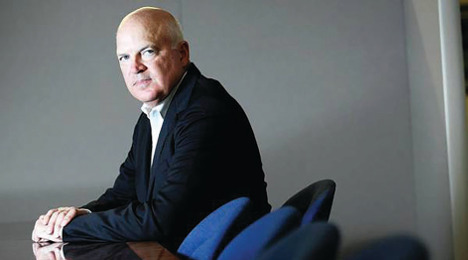National Auto Care and RoadVantage each announced this week that executives with nearly 45 years of combined experience joined their management team.
National Auto Care, an administrator of vehicle service contracts and ancillary products including the CarMark Certified Pre-Owned Program, appointed Steve Verney as the company’s chief financial officer, leading the finance, accounting and reinsurance teams.
In this new role, the company said Verney will work to help National Auto Care amplify its recent profitable growth and build an even stronger foundation for the next level of success.
Verney retired from Allstate Insurance in 2015 after a distinguished 34-year career. He held multiple senior-level roles in finance and risk management, including CFO of both property-casualty and life divisions, treasurer, and head of strategy and M&A. He completed his career at Allstate as executive vice president and chief risk officer. In each of these roles, he helped improve growth, profitability and financial strength as well as drive transformative change while developing strong financial talent and organizations.
"I am thrilled to join National Auto Care as we work together to build on the great work the team has done to achieve even greater success for our agents, employees, business partners and ultimately our shareholders,” Verney said.
National Auto Care chief executive officer Tony Wanderon added, “Steve’s strong qualifications and strategic mindset make him the perfect fit to take our financial management to the next level.
“With his expertise in all facets of financial operations, insurance and M&A, Steve brings a balanced ability to develop and execute strategies that will drive growth and competitive advantage for the company on a national level,” Wanderon went on to say.
Meanwhile another F&I product provider, RoadVantage, announced Mike Essig joined the company in the role of director of risk management.
Essig joins RoadVantage with 13 years of industry experience, specializing in actuarial analysis and risk management, most recently as risk management director and actuary at CNA National Warranty Corp. Prior to that post, Essig was a senior pricing and reserving actuarial analyst for Warranty Solutions.
“We are thrilled to welcome Mike to the RoadVantage team,” RoadVantage CEO Garret Lacour said. “Mike is highly regarded in his field, and has the right combination of skills and expertise to bring value to RoadVantage as we continue to grow.”
Lacour also mentioned that Essig joins RoadVantage as the company continues to experience record growth, expanding in contract volume, programs, staff and offices.
“I have known the RoadVantage leadership team for years, working with them during my time at CNA National, and I’ve been impressed by their smart strategies that have resulted in such rapid success,” Essig said. “I’m excited to be part of such a talented group.”
This week, defi SOLUTIONS rolled out its newest product offering defi SERVICING, a loan management and servicing system (LMS) along with an opportunity for auto finance companies to shape their roadmap for 2017.
The company highlighted the defi SERVICING LMS can give finance companies the same configurability and control that the defi LOS (loan origination system) provides to more than 70 finance companies today.
“We are instilling our vision of configurability, connection, and community into our new servicing system,” says Justin McClintick, program director of LMS for defi SOLUTIONS. “We’re inviting our clients to get in now on the ground floor to help drive the expansion of our servicing system into one that provides exactly what their company needs to take their servicing to a whole new level of efficiency and effectiveness.”
Like the defi LOS, the LMS system is fully configurable by finance companies, so there is no more waiting on IT or a vendor to make the changes needed to drive performance. Capabilities include real-time payment processing, loan adjustments, and extension processing.
The servicing system offers all the basics, like due date change eligibility, tracking, user defined queues and balancing, as well as advanced features like custom field creation and the ability to design each page of the system.
“Lenders should have the autonomy to make changes in their business systems when and how they want. That belief is at the core of everything we create at defi,” said Stephanie Alsbrooks, chief executive officer and founder of defi SOLUTIONS. “Together with our lending community, we’re bringing freedom to lenders by making technology solutions that make lending better for all.”
To get on board now and influence the development, finance companies are being encouraged to go to defiSERVICING.com where they can submit their contact information and join the community of servicing system experts who are driving the future in auto financing.
In addition to the new LMS offering, defi SOLUTIONS recently announced the release of defi ANALYTICS, an intuitive configurable reporting system that can give finance companies complete control over report access and design.
WalletHub recently released a report highlighting the top 20 cities where consumers took on the largest amount of financing to acquire a vehicle and where they also absorbed the least, generating extreme debt-to-income ratios.
In order to identify the cities with the highest and lowest vehicle finance debts, WalletHub’s analysts divided the average debt by residents’ income in each of 2,539 U.S. cities as of October based on TransUnion data. The site explained its sample considers only city proper in each case and excluded cities in the surrounding metro area.
Among cities that WalletHub determined to be over spenders, six were located in Texas. On the other end of the spectrum, six California cities were on the list for spending the least.
Here is the rundown:
Cities that overspend on cars
Ruston, La.
Williamsburg, Va.
Ellensburg, Wash.
Morgantown, W.Va.
College Station, Texas
Rio Grande City, Texas
Kingsville, Texas
Warrensburg, Mo.
Milledgeville, Ga.
Mercedes, Texas
Deming, N.M.
Stillwater, Okla.
Murray, Ky.
Newark, Del.
Bloomington, Ind.
Stephenville, Texas
San Marcos, Texas
San Luis, Ariz.
Delano, Calif.
Dahlonega, Ga.
Cities that spend the least on cars
Scarsdale, N.Y.
Cupertino, Calif.
Hoboken, N.J.
Saratoga, Calif.
Chevy Chase, Md.
Bronxville, N.Y.
Lexington, Mass.
Los Altos, Calif.
McLean, Va.
Manhattan Beach, Calif.
Palo Alto, Calif.
Foster City, Calif.
Ridgewood, N.J.
Westport, Conn.
Powell, Ohio
Winchester, Mass.
Westfield, N.J.
Garden City, N.Y.
Birmingham, Mich.
Plainview, N.Y.
More details and analysis can be found within WalletHub's complete report available here.
Consumer Portfolio Services chairman and chief executive officer Brad Bradley not only summarized how his company navigated the fourth quarter, but the outspoken industry veteran also perhaps gave a concise assessment of what’s happening at other subprime auto finance companies and the dealerships within their networks.
First, here are CPS numbers to give a backdrop of how Bradley approached his remarks during the company’s quarterly conference call with the investment community.
CPS posted its 22nd consecutive quarter of positive earnings, generating $7.5 million, or $0.26 per diluted share. The figure marked a bit of a drop-off from the $9.0 million, or $0.29 per diluted share, in net income the company posted during Q4 of 2015, but Bradley insisted the performance was in line with company expectations.
CPS’ revenue climbed 13.5 percent during Q4 and 16.1 percent for the full year, landing at $108.2 million and $422.3 million, respectively.
During the fourth quarter, CPS said it purchased $215.3 million of new contracts compared to $242.1 million during the third quarter of 2016 and $269.2 million during the fourth quarter of 2015. The company’s managed receivables totaled $2.308 billion as of Dec. 31, an increase from $2.292 billion as of Sept. 30 and $2.031 billion as of the close 2015.
The company’s annualized net charge-offs for Q4 stood at 6.97 percent of the average owned portfolio as compared to 6.23 percent for the fourth quarter of 2015. Delinquencies greater than 30 days (including repossession inventory) ticked up to 10.96 of the total owned portfolio as of Dec. 31 as compared to 9.53 percent a year earlier.
Bradley opened his remarks to the Wall Street watchers by referencing a Chinese proverb that states in part, “May you live in interesting times.”
He continued with, “We at least at CPS — and the industry — are living in interesting times. Again everything you see — higher delinquency, higher losses — now in the fourth quarter everybody slowed down as everybody dropped something between 15 percent and 20 percent in volume.
“There’s a lot concerns, regulatory and the economy and the industry in general. So these are interesting times,” Bradley went on to say.
Having been in the subprime auto finance business since 1991 is part of the reason why Bradley is confident CPS will navigate through whatever challenges might be coming later this year.
“Generally speaking that’s a lot of what the fourth quarter came out at, that’s a lot of what 2017 is going to come out at,” Bradley said. “(The company will be) trying to stay the course and just see how the rest of these moving pieces shake out and hopefully be in a position to take advantage of it and maybe be in a position to have done the best of everyone there. So we’ll see how it goes but that is kind of the focus we’re going to have.”
As mentioned previously, CPS bought less paper during Q4 and Bradley explained why — again referencing what might be the case for other companies, too.
“The business was slow in the fourth quarter, significantly slower than we would have expected. Again our focus is on quality over quantity,” Bradley said. “You can almost feel the other companies reaching to provide their earnings or the growth that they’re expected to have, (but) we’re not in that kind of position. And so we’re not trying so hard and as a result our numbers are down a bit. But again we would rather have the quality over the quantity any day of the week.”
Later in the call, Bradley went on to say. “Lot of people in the originations area are seeing more and more sort of challenging or bad loans that we don't want to buy, and that’s a real good indicator of what's coming out of the dealership. And the way it works is if we’re seeing a lot of good loans, it means we get what we want to the extent, and also it means that dealers have lots of loans to send you.
“To the extent that problems are getting more difficult, dealers start trying to push through riskier and not-as-good loans. And so when you start seeing more of those, you can almost tell that in the marketplace, the dealers are struggling just as much as we are because they’re trying to push through bad deals that we don't want and they know most times we’re not going to buy them,” he continued.
“So that gives you an idea that they're even trying to send and shows you that the market is difficult. But again keeping our originations model the way we want it, and buying what we want to buy, in the end will pay off much better than any other course,” Bradley said.
View of collections
Bradley also touched on how CPS is handling collections. It’s been nearly three years since CPS agreed to pay more than $5.5 million to settle charges from the Federal Trade Commission that the company used “illegal tactics” to service and collect consumers’ contracts.
“In terms of collections, I think everybody is now, at least we are, comfortable with the new dynamic that given all the technology our customers are a whole lot smarter and a whole lot more aware of what's going on. And so when we’re looking for them, they just look at their iPhone and decide whether or not to take the phone call,” Bradley said. “However, when we then tell them we’re going to take their car, they pay.
“And so we’ve now for over a year or more run this higher (delinquencies), but not with horribly higher loss rates,” he continued. “If the loss rates truly tracked the (delinquencies) that we’ve been seeing, the losses would be much, much worse. And so there really is this new thing or new dynamic where customers pay you when you’re going to take their car as opposed to just paying you as soon as you start calling them. We’ve gotten used to that.
“We’ve redone the way we collect and certainly part of that is the regulatory environment, the way you now have to speak to customers and how often you can call them and things like that,” Bradley went on to say. “That whole thing is now settled in as our culture has changed and so we’re real happy with that.”
Update on securitizations
Back in January, CPS announced the closing of its first term securitization in 2017. The transaction was CPS’ 23rd senior subordinate securitization since the beginning of 2011 and the sixth consecutive securitization to receive a triple-A rating on the senior class of notes from at least two rating agencies.
In the transaction, qualified institutional buyers purchased $206.3 million of asset-backed notes secured by $210.0 million in automobile receivables purchased by CPS. The sold notes, issued by CPS Auto Receivables Trust 2017-A, consisted of five classes.
Ratings of the notes were provided by Standard & Poor’s, DBRS and Kroll Bond Rating Agency, and were based on the structure of the transaction, the historical performance of similar receivables and CPS experience as a servicer.
Note
Class |
Amount |
Interest
Rate |
Average
Life |
Price |
S&P
Rating |
DBRS
Rating |
KBRA
Rating |
| A |
$99.12 million |
1.68% |
.87 years |
99.99906% |
AAA |
AAA |
AAA |
| B |
$29.92 million |
2.68% |
2.14 years |
99.98567% |
AA |
AA (high) |
AA |
| C |
$32.66 million |
3.31% |
2.84 years |
99.98111% |
A |
A |
A |
| D |
$24.57 million |
4.61% |
3.59 years |
99.99845% |
BBB |
BBB (low) |
BBB |
| E |
$20.05 million |
7.07% |
4.14 years |
98.98958% |
BB- |
BB (low) |
BB- |
The weighted average coupon on the notes was approximately 3.91 percent.
The 2017-A transaction has initial credit enhancement consisting of a cash deposit equal to 1.00 percent of the original receivable pool balance and over-collateralization of 1.75 percent.
The final enhancement level requires accelerated payment of principal on the notes to reach overcollateralization of 5.15 percent of the then-outstanding receivable pool balance.
Bradley mentioned in a company news release that the securitization CPS completed last October “achieved the lowest blended cost of funds of any deal since the second quarter of 2015.”
During the quarterly conference call, CPS chief financial officer Jeffrey Fritz added, “The asset-backed market continues to be very liquid, and so we continue to take advantage of that.”
VisionMenu, a provider of software selling solutions to automotive and powersports dealers, recently released Remote F&I- a remote menu, disclosure and document signing web application that uses vSignature technology to control what a customer views on their smartphone and allows eSigning of any document.
The company said the remote tool can give dealership F&I personnel 100-percent control over what is displayed on the customer smartphone or tablet device, no matter where the customer is located — for instance, the finance office or in the privacy of their own home.
“Remote F&I gives the F&I manager a tool to sell more products to the online buyer, or any buyer that can’t make it into the dealership,” said VisionMenu president Ron Martin. “It also gives them a tool to e-Sign documents so the customer doesn’t have to come back to the dealership to resign forms. It can even serve as a tool to close a deal with the buyer at the dealership and the co-buyer at a remote location.”
The VisionMenuPRO platform includes VisionMenu, VisonReport, vRate, vContract, vSignature, and Remote F&I. These solutions are designed to help dealers sell more units, increase F&I product sales and efficiencies, eRate, eContract, eSign Documents and provides them the analytics they need to evaluate profitability.
The latest TransUnion Industry Insights Report found that 80 million consumers held a vehicle lease or retail installment contract as of the close of 2016. Analysts determined the figure marked the highest level TransUnion has observed since at least the third quarter of 2009, as approximately 4.3 million additional consumers last year took out what can be clearly classified as vehicle financing.
However, SubPrime Auto Finance News asked TransUnion’s Jason Laky to consider whether the funds consumers are using to acquire a vehicle are coming from other sources such as personal loans, which reached a new milestone at the conclusion of 2016 with total balances topping $100 billion for the first time ever.
Laky is senior vice president and automotive and consumer lending business leader for TransUnion, so his jurisdiction is both the auto finance and personal loan markets. Laky approached this difficult question by first explaining the primary reasons personal loans exist.
“For the prime or better consumers, the biggest use of the personal loan but not the only one is debt consolidation,” Laky said. “A lot of lenders are promoting to use a personal loan to pay off credit cards or other high interest loans you have at a lower interest rate and a predictable monthly payment that an installment gives.
“The second use that’s more prevalent in the non-prime and subprime areas where consumers don’t have as much financial security, those loans tend to be used for more immediate needs, whether it’s large repairs or a bridge loan for some education, something like that. The loan sizes are a little smaller and the use tends to be much more utilitarian,” he continued.
Laky explained that TransUnion’s data cannot shed specific light on what purpose consumers use personal loans; if they are in fact the monies used by a consumer to make the necessary down payment for an auto finance company to complete underwriting of the contract. But Laky also acknowledged there has been rumblings of this practice happening more often.
“One thing we’ve certainly started to pay attention to is we have heard it mentioned out the marketplace this idea of using the personal loan to make the down payment or to cover negative equity,” Laky said. “We don’t see in the TransUnion credit file the actual use of the personal loan. We don’t know where the funds go, but it’s certainly a possibility.
“We’ve heard a couple of lenders mention that it may be going on out there. It’s certainly something we may go ahead and look at studying,” he continued. “From a lender’s perspective, I’m sure that whenever you have a consumer that takes out a personal loan in order to cover some gap in the auto financing, it’s probably a flag that’s a higher risk consumer than maybe you think.”
The amount of risk finance companies, banks and credit unions are already holding in the auto finance market still is growing significantly. TransUnion reported total auto financing balances climbed to $1.11 trillion at the close of 2016. Analysts indicated the total balance grew 8.3 percent during 2016, slower than the average growth rate of 11.0 percent between 2013 and 2015.
The average vehicle financing balance per consumer also rose slightly to $18,391, up from $18,004 in Q4 2015.
“For the second consecutive quarter, total auto balances had a year-over-year growth rate below 10 percent, reflecting the slower growth that we are seeing in new car sales,” Laky said in a news release from TransUnion.
“In the third quarter, auto originations declined year-over-year for the first time in six years,” he continued. “Prime plus and super prime originations continued to grow in Q3 2016, indicating lenders are beginning to shift their focus away from the riskiest segments, where we’ve seen strong competition among lenders that has put pressure on risk adjusted margins.”
TransUnion determined that originations declined 0.8 percent to 7.46 million in Q3 2016, down from 7.52 million in Q3 2015. Subprime originations experienced the largest decline (down by 3.2 percent), and prime plus (up 1.8 percent) and super prime (up 1.7 percent) originations grew in the third quarter of 2016.
Analysts went on to mention the auto delinquency rate reached 1.44 percent to close 2016, a 13.4-percent increase from 1.27 percent rate in Q4 2015. They added auto delinquency is at its highest level since the Q4 2009 reading of 1.59 percent.
More details about personal loans
As mentioned previously, TransUnion’s Industry Insights Report confirmed personal loans reached a new milestone at the end of last year with total balances topping $100 billion for the first time ever. While younger consumers have played a major role in the growth of these lending products, analysts found that, contrary to popular belief, mature borrowers are leading the charge on these loans.
TransUnion added that total personal loan balances grew $14 billion between year-end 2015 and year-end 2016, reaching $102 billion. The number of consumers with a personal loan continued to climb steadily and ended 2016 at the highest level since at least Q3 2009. In Q4 2016, 15.82 million consumers had a personal loan.
TransUnion noted baby boomers comprised 32.8 percent of all consumers with a personal loan when 2016 ended, followed by Gen X (31.6 percent) and millennials (26.6 percent). In Q4 2013, millennials were just 23.5 percent of personal loan users, but their share has grown over the past three years to reach 26.6 percent at the end of 2016.
“There is a perception that personal loan growth has been driven by younger consumers, but our data clearly indicate that these loans are appealing to older borrowers,” Laky said in the same release. “We believe some of this growth is occurring because interest rates may be lower than other type of loans for certain baby boomer segments.”
Analysts went on to mention the personal loan delinquency rate was 3.83 percent in Q4 2016, the highest Q4 reading since Q4 2013 and up from 3.62 percent in Q4 2015. Originations, viewed one quarter in arrears, declined for the second consecutive quarter. Originations dropped 5.7% from 3.75 million in Q3 2015 to 3.54 million in Q3 2016.
“We’ve observed a decline in non-prime lending that we attribute to mid-year FinTech funding challenges and regulatory uncertainty in advance of the election,” Laky said. “We believe that the personal loan market is stabilizing, and have seen balances grow across risk tiers through the end of the year.”
With Valentine’s Day here, research showed individuals who might be married or in an exclusive relationship and perhaps sending applications to your finance company or walking into your dealership showroom, aren’t together just because of physical attraction or engaging conversation.
A January YouGuv survey of more than 1,100 adults compiled for TransUnion determined 24 percent of people believe a good credit score makes someone more attractive.
Meanwhile, SunTrust Bank found that 41 percent of Americans consider financial stability to be among the traits they find most important in a partner, ranking only behind personal values (78 percent) and personality (73 percent).
Furthermore, SunTrust learned that more people value financial stability than looks (21 percent) or physical fitness (21 percent), according to an online survey conducted in January by Harris Poll on behalf of SunTrust among more than 2,000 U.S. adults.
“People identify financial stability as an important trait because they know money — and how one manages it — impacts a relationship,” said Brian Ford, financial well-being executive at SunTrust Bank.
“People often enter relationships with different monetary goals and views. For example, one may want to save more for retirement and can’t understand why a partner is more focused on short-term experiences. The keys to overcoming financial discord in a relationship are communication and compromise,” Ford continued.
SunTrust offered a quartet of questions adults in a relationship can ask each other; discussion points that dealership salespeople or F&I office personnel could use as well to make sure the couple enjoys the vehicle long after delivery:
— What are your most important goals? Talk to your significant other about aspirations and make a list of what you have in common. If aligning your goals is difficult, create a blend that represents your collective core values.
— How does your past influence your spending and savings habits? Make an effort to understand your partner's personal history. Financial habits are often handed down by parents, so it's important to empathize with your partner and understand how he or she was raised.
— Would you share your plans before making a big-ticket purchase? It's important to know whether your partner wants to maintain a level of financial independence. Decide whether you need to talk with each other before making purchases above a certain price point, or whether you agree to keep finances separate.
— What is your debt philosophy? Financial disagreements often arise from different views of debt, from how much to use a credit card to the term and amount of new-vehicle financing. Ask your partner what he or she considers an acceptable level of debt and see how much it diverges from your answer.
Automotive and asset finance software solutions provider White Clarke Group recently released its latest publication titled, “Global Technology Report 2017: Auto Finance in the New Digital Ecosystem.”
The company highlighted the report, and accompanying summary video that can be viewed here or at the top of this page, draws important conclusions from discussions between technology experts and senior delegates from the world’s largest captive finance providers at White Clarke Group’s annual Auto Captives Summit, which took place in London last November.
The summit identified four main elements that are driving the new digital ecosystem. These elements, which the report describes in detail, include:
• The changing nature of the customer base;
• The transformational nature of new technologies such as artificial intelligence, chatbots and blockchain
• The accelerating pace of technology causing disruption to traditional business models
• The growing threat from cybersecurity and ever-growing regulatory and security demands
Brendan Gleeson, group chief executive officer of White Clarke Group, summed up delegates’ findings.
“We are in an age of ‘connected intelligence’, surrounded by a range of products and services which link together to make up a digital ecosystem,” Gleeson said. “We are experiencing an explosion of innovation, which has a profound impact on how we interact with each other, and how businesses build and maintain a relationship with their customers.
“To succeed in the new ecosystem, organizations must adapt fast –learning new skills, staying abreast of new technology and developing new models for the delivery of finance to avoid the threat from disruptors,” he went on to say.
To download a free copy of “Auto Finance in the New Digital Ecosystem,” go to www.whiteclarkegroup.com.
Specialty auto finance company Exeter Finance Corp. announced on Monday that it appointed company veteran Brad Nall to be chief financial officer in a move that was effective Feb. 1.
Nall joined Exeter in July 2012 and has more than 25 years of experience in the consumer finance industry. He has held numerous senior roles during his career within budgeting and strategic planning, financial reporting, project management, business development, mergers and acquisitions, whole loan sales and structured finance.
The company highlighted Nall also has a strong background in the areas of operations, risk management, credit and pricing, accounting, control and compliance. Prior to Exeter, he spent 12 years at Citi's auto finance and personal loan businesses in various finance roles.
“I am pleased and honored to serve in this role for Exeter Finance,” Nall said. “During my tenure here, I have seen the company grow and thrive beyond expectations. I look forward to contributing to the continued growth of the organization as well as serving our dealers and customers in the most effective manner possible.”
Exeter chief executive officer Jason Grubb added, “Brad’s extensive financial experience, industry knowledge and exhaustive commitment to our company's success will be invaluable as we continue to execute our business plan and strategic initiatives.”
And the company apparently will be executing that strategy under the assumption that there is not a subprime “bubble” inflating. Grubb agreed with assertions made by the three credit bureaus at the outset of the Vehicle Finance Conference hosted by the American Financial Services Association last month in New Orleans. Grubb participated on the CEO panel to close the event and touched on the topic.
“Our 2016 vintages performed better than 2015,” said Grubb, who also is a member of AFSA’s board of directors. “Even though we’ve seen a deterioration in the wholesale market where our severity is worse but our frequency is less. Most people grabbed more yield in 2016 so they’ve been able to save their margins even though we’ve seen a decline in the wholesale market.
“There are headwinds obviously,” he added. “Hopefully a lot of us have been originating with lesser LTVs and provisioning for the losses. We can add an adjuster for higher depreciating vehicles and other measures that can be taken to offset some of this.”
GWC Warranty — a provider of used-vehicle service contracts and related finance and insurance products sold through dealers — and Carleton, a provider of compliant financing calculation and digital document software solutions, each made personnel moves this week.
At GWC Warranty, the company promoted Mike Silverman to the position of director of marketing strategy.
Silverman joined GWC Warranty in 2014 as the manager of product strategy and has since overseen product improvements and new product development aimed at helping dealers sell more vehicles. In his new role as director of marketing strategy, GWC Warranty said Silverman will have added input and influence over all aspects of the company’s marketing strategy.
“Mike’s accomplishments during his tenure at GWC have consistently contributed to the success of our dealer partners and in turn been a key factor in our company’s growth in recent years,” GWC Warranty chief executive officer and president Rob Glander said.
“We are confident that his leadership and vision for our future will continue to have a positive impact on GWC as a whole,” Glander continued.
The company also recently released the fourth video in the award-winning Behind The Wheel dealer story series.
The latest release in the Behind The Wheel series features Texas Cars Direct, a luxury used-car dealer in Dallas. GWC Warranty highlighted Texas Cars Direct’s story is one entrepreneurship and a unique zero-frills approach to buying high-end used vehicles that is complemented by a quality VSC product provided by GWC Warranty.
Owner Pete Bulban opened the dealership more than 35 years ago and has been making luxury vehicle ownership affordable ever since.
“Behind The Wheel continues to uncover and document impactful stories of dealers and their personal visions for success,” Glander said. “The story of Texas Cars Direct is truly unique while also bringing to life the entrepreneurial spirit that so many dealers share.
“These types of businesses are a natural fit for GWC’s commitment to provide a best-in-class vehicle service contract experience,” Glander went on to say.
Behind The Wheel, winner of a 2015 Automotive Communication Award, pulls back the curtain to unveil the people and communities that make dealers successful.
Each dealership’s story also delves into how GWC Warranty’s service, products, training and technology align with dealers’ missions to operate reputable, successful businesses.
To view the story of Texas Cars Direct, as well as past Behind The Wheel videos, visit www.GWCwarranty.com/BehindTheWheel.
Carleton broadens offerings & adds staff
This week, Carleton announced the second of a series of initiatives to help promote compliance success for its clients with federal regulatory changes possibly coming this year involving the Consumer Financial Protection Bureau and other uncertainty surrounding the Dodd-Frank Act.
Carleton expanded its compliance support with the addition of an expert with proven legal experience.
Attorney Sarah Way has joined the Carleton team, bringing with her valuable legal background and expertise which includes business law, contract development and documentation, intellectual property regulations, property insurance law and other litigation disciplines.
”I came to know of Carleton through its reputation in the local, South Bend community,” Way said. “But it quickly became clear that Carleton is a compliance leader in the area of consumer finance. I’m thrilled to be joining Carleton as they continue to grow and thrive in the industry.”
Way will be tasked with supporting Carleton’s software solutions. The comprehensive solution suite of CarletonCalcs, CarletonDocs, CarletonAudit, and CarletonAccess can help finance companies mitigate legal and regulatory risk compliance of consumer loan calculations. These technologies include federal and state-specific installment contract/lease calculations, digital document generation, electronic-audit reporting, and other compliance tools to support various financing compliance mandates.
“Sarah will add tremendous legal expertise to our compliance research department,” Carleton president and CEO Pat Ruszkowski said. “The addition of Sarah Way demonstrates Carleton’s long term commitment to provide lenders with expert solutions and support that will meet the ever changing compliance landscape.
“We intend to enhance our compliance leadership position in 2017 so that we can continue to help drive the success of our customers and earn their satisfaction and trust,” Ruszkowski went on to say.
Before Carlton brought on Way, its management team made the first of multiple executive additions expected this year by hiring Pete Radike as director of client and channel engagement.
Radike brings more than 20 years’ experience providing leadership and solutions to the consumer, business, mortgage, credit card, auto, and private label lending industries. His diverse industry knowledge and extensive client-centric background further enhances and drives the current Carleton team towards the future.
“Pete’s vast compliance experience providing nationwide LOS solutions greatly compliments Carleton’s 40 years providing compliance solutions to the consumer lending industry,” Ruszkowski said. “The addition of Pete represents Carleton’s commitment to drive current and future clients towards compliance success.”
Prior to joining the Carleton team, Radike spent nearly 12 years as director of product management and strategy at Fiserv.
“Carleton’s continued leadership in the mission-critical compliance industry for more than 40 years demonstrates its commitment to lending success on behalf of its clients,” he said. “It is both exciting and satisfying to join the standard-bearer for loan origination compliance throughout the financial services industry.”












